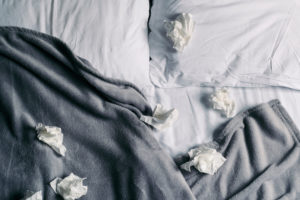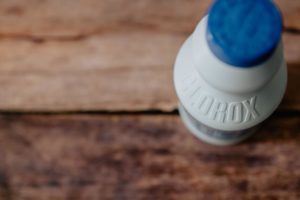CORONAVIRUS: EVERYTHING YOU NEED TO KNOW
An Eastern And Western Medicine Overview

New information on the development of the coronavirus is coming to light every day. As you’re locked in your house, you’re likely reading everything and anything out of both concern and boredom. The scientific terminology can be overwhelming and sifting through the terribly incorrect advice (drinking bleach or hoarding toilet paper is never the answer) is annoying. We’ve rounded up the most current information from both the Eastern and Western medical perspective to give you everything you need to know about COVID-19, the 2020 coronavirus.
What is Coronavirus?
Plain and simple, coronavirus is a type of virus (you, don’t say!). Some viruses cause disease while others don’t. This particular coronavirus results in a respiratory illness. By now, you’ve probably learned that COVID-19, the current coronavirus causing mayhem, originated in Wuhan, China in December 2019. While there is no confirmation on how the outbreak occurred, most people assume it’s from animals at a local wet market (selling live animals, fish, etc.).
On January 7, 2020 it was announced that the illnesses emerging in Wuhan, China were declared a new strain of coronavirus called SARS-CoV-2. To many, this was still considered the “Wuhan pneumonia” until the World Health Organization (WHO) provided the official name of Coronavirus Disease-2019, or COVID-19 for short on February 11th.
So what’s the difference between this type of coronavirus and others? The resulting disease and symptoms. Coronaviruses are actually a family of many different viruses. They are categorized as common in both humans and many animals like bats, cattle, camels, and cats. In some rare situations, an animal with a strain of coronavirus can spread it to people. These types of situations produced the current COVID-19 (or SARS-CoV-2), as well as outbreaks of SARS which started in 2003 and MERS in 2012. Though they all are from the same viral family, the details surrounding each illness are very different.
What are the Symptoms of Coronavirus?
 From what we know about coronavirus so far, the severity of COVID-19 can range from what feels like the average cold to deadly. The most common symptoms include fever, dry cough, and difficulty breathing or shortage of breath, though more recent reports indicate that hearing loss is present for some as well.
From what we know about coronavirus so far, the severity of COVID-19 can range from what feels like the average cold to deadly. The most common symptoms include fever, dry cough, and difficulty breathing or shortage of breath, though more recent reports indicate that hearing loss is present for some as well.
The tricky thing about this virus is that many people don’t experience any symptoms at all, and don’t even realize they have it. This can lead to unintentional exposure of the virus to others. On the opposite end of the spectrum, those with the most intense cases of coronavirus require hospitalization. Those who fall in the mild to moderate range of intensity can often treat the illness from home.
When diagnosing coronavirus from a Traditional Chinese Medicine perspective, doctors on the frontline in China noticed several unique symptoms that differentiated between coronavirus and the flu. TCM coronavirus symptoms present themselves as a specific, unusual pulse – slippery at the CUN position and tight and fast at the Guan and Chi positions. A patient’s tongue is likely to have a heavy coating between white and yellow in color and some will have a thorny appearance around the edges.
How Coronavirus is Spread
While coronavirus was very likely originally spread from an animal, you’re not off the hook just because you avoid shopping in live meat and fish markets. Once the virus was transferred to humans, it began to spread from person to person. The virus is believed to spread through respiratory droplets (read: anything that comes out of you when you sneeze or cough). This means that while you’re unlikely to get it by breathing the same air as someone with the virus, you essentially want to be very careful about swapping spit or other bodily fluids.
Common ways coronavirus can spread include getting in close range of the spray of droplets from a cough or sneeze, or sharing food, drink, or eating utensils. It’s also believed that touching an item or surface after someone with the virus and then touching your face, mouth, nose, or eyes can also lead to infection, with some reports showing that the virus can live on surfaces for anywhere from hours to days. Due to these observations, it’s suggested that a 6-foot separation range be in place around other people, and it’s recommended that you wash your hands regularly and keep surfaces clean.
How Contagious is Coronavirus?
COVID-19 has been deemed a highly contagious illness. Though data on this virus is constantly evolving as we learn more, currently it’s believed that for every one person who has coronavirus, they are likely to infect between 1.4 to 2.5 people.
How does this stack up against other illnesses? It’s actually on the lower side. Going off the same foundation of the impact of one contagious individual, the flu typically infects 1.5 others, mumps is at 5.5, smallpox and rubella both clock in at around 7, and measles can infect a whopping 12-18 range. What about the other illnesses in the coronavirus family? SARS is more contagious at an average of 3.5 while MERS is less, at only .75 people.
How to Avoid Getting Coronavirus
 Want to avoid spreading or getting coronavirus? The standard advice from the WHO and CDC include washing your hands frequently with soap and water, covering coughs and sneezes, and regularly sanitizing commonly touched surfaces. Maintaining that 6-foot separation, practicing social distancing, or even fully quarantining yourself are additional precautions you can take.
Want to avoid spreading or getting coronavirus? The standard advice from the WHO and CDC include washing your hands frequently with soap and water, covering coughs and sneezes, and regularly sanitizing commonly touched surfaces. Maintaining that 6-foot separation, practicing social distancing, or even fully quarantining yourself are additional precautions you can take.
From a TCM perspective, you’ll want to consider your daily lifestyle from all angles. While there are plenty of specific ways to build immunity holistically, the basics include eating nourishing, well-rounded meals to help ensure your body stays strong and maintaining a consistent exercise schedule. You can also add medicinal mushrooms, ginger, turmeric, echinacea, and other power foods to your daily routine. If you want to design an immune system support plan specific to you, contact your TCM practitioner and medical team. You can expect a combination treatment that might include some of the following; herbal treatments, acupuncture, moxibustion, and diet or lifestyle changes.
Incubation Timeline
In case you aren’t familiar, an incubation period is the length of time it takes for symptoms to begin after contracting the virus. From the data gathered so far symptoms have been appearing sometime between 1 and 14 days of exposure to the virus, but most commonly symptoms seem to appear at 5 days. A recent report listed that more than 97% of people who contract COVID-19 will begin to show symptoms within 11.5 days after exposure. The incubation period for coronavirus is one of the reasons why the average quarantine period is set to 14 days. This is to allow enough time to truly determine if the virus is present for the majority of people.
Can You Transmit Coronavirus Even if You Don’t Feel Sick?
The short answer: absolutely, yes. One of the most challenging aspects of this virus is that many people who feel fully healthy can unknowingly carry the virus and pass it on. Many people with COVID-19 have very mild cases and show few to no symptoms at all. However, just because someone doesn’t feel sick, doesn’t mean they don’t have the coronavirus.
This means you can easily pass coronavirus on to others who are at high-risk without realizing it. And as we’ve just outlined above, you’re likely to infect up to 2.5 other people with the virus. Because of the hidden nature of coronavirus, many people during the outbreak have adopted the mentality of acting as though they do have it to take every precaution to reduce the spread.
What’s the Cure for Coronavirus? (H2)
As of late-March 2020 there is no official treatment, vaccine, or cure for COVID-19. Currently, patients diagnosed with coronavirus are being treated on a symptoms-basis. Those with mild to moderate cases often have symptoms that can be treated at home with rest, sleep, staying warm, and drinking plenty of liquids. Anyone who develops a severe cough or has difficulty breathing should seek medical treatment. If you’re worried you may have the coronavirus, it’s advised that you first call your doctor before going to an office or the emergency room.
In many countries, holistic treatments based in Traditional Chinese Medicine are being used to help ease the symptoms and facilitate the healing process for coronavirus patients. Herbal remedies have been prescribed to many patients by practitioners in China, showing success in easing symptoms but not for a total cure. Acupuncture has also been used for pain reduction and to help deepen sleep.
Though there’s no cure yet, scientists around the globe are working hard to study and develop a vaccine. The first U.S. clinical trial investigating potential vaccines for coronavirus began on March 17th in Seattle, Washington. The vaccine in question was developed by Moderna and is called mRNA-1273. The WHO has also launched a global clinical trial to test existing, approved drugs that might work to ease symptoms or cure coronavirus.
Noted drugs included in this study include Ritonavir/lopinavir which was created to treat HIV infections but has also proven beneficial for MERS and SARS patients. Remdesivir, which was originally designed in hopes of (it unfortunately didn’t work) curing Ebola, is also included. The final treatment of note being tested is Chloroquine and hydroxychloroquine. This antimalaria drug is also used for rheumatoid arthritis and has raised concerns from some medical professionals for its connection to heart problems.
Newer
Staying Inside to Avoid the Coronavirus? 13 Holistic Ways to Prepare
Older
Why AutoImmune Sufferers Are Turning To TCM
Comments (0)
Leave a reply
You must be logged in to post a comment.




